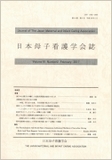Japanese
English
- 有料閲覧
- Abstract 文献概要
- 参考文献 Reference
- サイト内被引用 Cited by
目的
産後1ヶ月の母親の育児不安を明らかにする。
対象と方法
産後1ヶ月健診を受診した母親を対象とした。期間は平成27年8月11日〜平成27年10月31日。方法は、承諾を得られた母親に自由記述式調査票と返信用封筒を配布し郵送回収した。自尊感情の測定にはRosenberg自尊感情尺度を使用し、その回答を自尊感情得点の平均点で2群分けをして高低群とした。自由記述の解析には、Text Mining Studioを使用し、定量的言語解析を行った。倫理的配慮は、高崎健康福祉大学倫理審査委員会(第2720号)の承認を得た。
結果
有効回答数140名を研究対象とした。対象者の平均年齢は32.4(SD±5.0)歳であった。初産婦63名(45.0%)、経産婦77名(55.0%)であった。
記述回答の結果、「退院から1ヶ月健診までの期間、どのような気持ちで過ごしましたか」の質問に対する回答より単語頻度解析では、自尊感情の高い群で「子」「思う」「赤ちゃん」「気持ち」「不安」、低い群では「子」「不安」「思う」「心配」の出現頻度が多かった。「不安」の内容は、仕事と育児の両立、体重、母乳・ミルク、泣き、児の健康、サポート、母親の身体、漠然とした不安であった。単語間の関係分析ことばネットワークでは、「子」「上」で、「上の子ども」をめぐる記述が多かった。
結論
産後1ヶ月の母親は、子どもをめぐる不安が強いことが明らかとなった。
育児不安に対しては、産後1ヶ月においては実母による情緒的サポートがあることが望ましい。自尊感情の高低群共に子どもに対する不安はあるが、特に上の子をめぐる不安があることが明らかとなった。
Objective
To reveal the maternal parenting anxieties one month after giving birth
Target and Method
Target: Mothers receiving one-month checkups for newborns, from August 11 to October 31, 2015. Method: Distribution of open-response questionnaire and addressed envelop to consenting mothers, for return by mail. Self esteem measured by Rosenberg method, with responses used to segregate average self-esteem scores into two(high and low esteem) groups. Use of Text Mining Studio for quantitative language analysis of replies to question: "How did you feel during the period from leaving the hospital to your one-month exam?" In view of ethnical considerations, the consent of the Takasaki University of Health and Welfare Ethics Screening Committee(No.2720) was obtained.
Results
The research addressed valid responses from 140 mothers. Average target age was 32.4 years(SD±5 years). The breakdown was 63 "first birth" mothers(45.0%) and 77 "previous birth" mothers (55.0%).
Open-responses totaled 140 comments in all. Under word frequency analysis, the "high self-esteem group" showed high occurrence rates for the terms "child," "thoughts," "baby," "feelings" and "anxiety." For the "low self-esteem group," frequency was high for "child," "anxiety," "thoughts" and "worries." Among "anxiety," the contents of responses included the work-parenting balance, body weight, mother's milk and processed milk, crying, infant health, support, the mother's physical state and vague uneasiness. Judged by the inter-word relationship analysis language network, frequent mention was made of "older children" surrounding use of terms "child" and "older."
Conclusion
It was clear that mothers targeted in the survey felt strong anxieties surrounding their children one month after giving birth. It is desirable to have emotional support from real mothers one month after giving birth for parenting anxieties. It is clear that although there are anxieties about children in both the group with high self-esteem and the group with low self-esteem, there are especially anxieties concerning first children.
Copyright © 2017, The Japan Maternal and Infant Caring Association All rights reserved.


